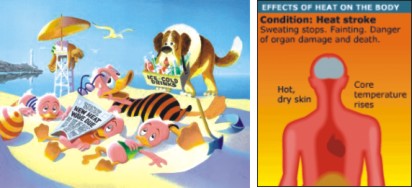|
Health
Beating the Heat
The heat is on as everyone is more than aware of. And as the gorom kaler seasons continue the city is getting increasingly hotter. Teamed with the hot sun, the frequent bursts of load shedding and the lack of rain to provide the melting people of the city any kind of respite, it is becoming increasingly more difficult for people to focus on their daily lives as well as results in many people falling.
 One of the most common illnesses during those long hot summer days is hyperthermia, more commonly known as heat stroke or sunstroke. As casual as it sounds heat stroke is not something to be taken lightly. It is, in fact, a very serious illness that may often result in death. Heat stroke occurs when the body absorbs more heat than it can take and as a result, the body's natural cooling system shuts down, resulting in the person in question not sweating at all. One of the most common illnesses during those long hot summer days is hyperthermia, more commonly known as heat stroke or sunstroke. As casual as it sounds heat stroke is not something to be taken lightly. It is, in fact, a very serious illness that may often result in death. Heat stroke occurs when the body absorbs more heat than it can take and as a result, the body's natural cooling system shuts down, resulting in the person in question not sweating at all.
People in countries such as Bangladesh are more prone to heat stroke due to the high level of exposure to the sun. Although it is near impossible to avoid the sun for most people, there are a few precautions that people should take in order to avoid it.
The number one preventive factor is staying in a cool place. However, seeing as though this is not always an option for most people, the second best option is to drink lots of water. Carry a water bottle everywhere you go and drink it throughout the day, even if you are not thirsty. Part of the reason for heat stroke is dehydration. Another preventive option is to reduce strenuous exercises for the mornings and the evenings, when it is cooler and the sun's rays are not as strong. Again, however, in our poor nation, as this is not always feasible or even possible it is important for people to try carrying a wet towel. Those who work outdoors should take turns with their fellow workers to spend time in the heat. Dress appropriately in loose fitting, light coloured clothes that covers as much skin as possible in order to avoid sunburn -- and yes, people of our colour are susceptible to sunburn -- and wear a wide-brimmed hat to protect your head and face. Avoid drinks with caffeine in them. Increase your salt intake during mealtimes as salt affects the parts of your body that sweat. Do not overdo it. Just a little more than your normal intake should be fine. Eat small meals throughout the day rather than three big meals as large meals are more difficult to digest and therefore create more internal heat in order to digest. Avoid high protein foods such as meat and nuts.
If you come across someone who seems to be suffering from heat stroke call a doctor and make the person lie down in a cool place and elevate their legs about 8-12 inches above their head. Apply cold towels and ice packs to the victim's body in order to cool the body's temperature down. It is important to take off most of their outer clothing so that they can breathe easier. If the person is conscious give them small sips of water. Do not make them drink it all at once as it might cause the person to throw up. Little sips of water, mixed with a little salt, or orange juice should do the trick.
Symptoms to look out for in a heat stroke patient are:
* A high temperature, above 105 degrees
* No sweat on their body
* Dizziness and nausea
* Rapid pulse
* Fainting spells
It is important for people to be aware that heat stroke is extremely serious and is common in countries such as Bangladesh. If not handled properly heat stroke can cause permanent damage and may even be fatal. Therefore during these extremely hot months it is integral for us to all be as careful as is possible. Drink lots of water, wear comfortable, cool clothing and above all, stay cool and safe.
http://phoenix.about.com/cs/desert/ht/heatstroke.htm
http://www.indygov.org/eGov/Mayor/PR/2006/7/20060717c.htm
http://pediatrics.about.com/od/summersafety/a/heat_illness.htm
Copyright
(R) thedailystar.net 2007
|
